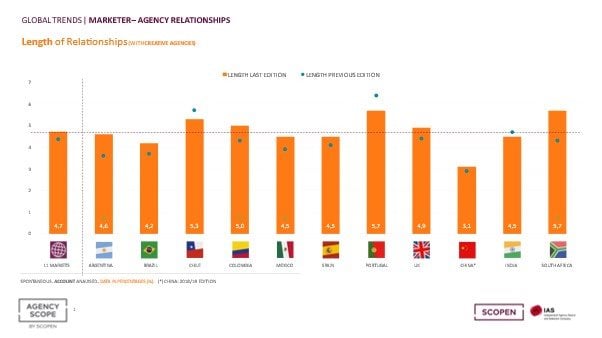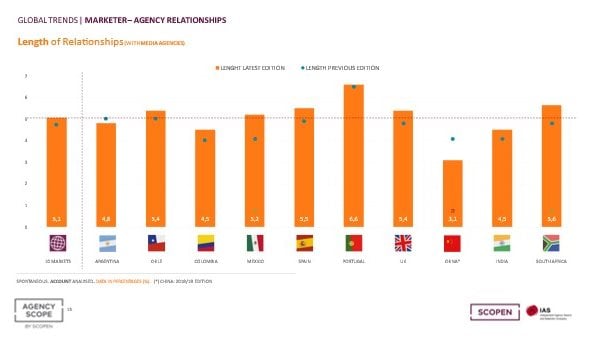
Top stories





Marketing & Media#BehindtheSelfie: Adriana Woolridge, marketing manager at Homemation
Karabo Ledwaba 2 days

RetailSuperga’s century of style: Celebrating 100 years of the iconic 2750 classic
Crick Group 7 Apr 2025
More news















César Vacchiano, president and CEO of Scopen, interprets data from a recent Agency Scope global trends analysis.
“Artificial Intelligence is reshaping creativity, and as agency structures evolve and brand strategies undergo a fundamental shift, industry leaders must adapt or risk falling behind,” he says.
Artificial Intelligence is revolutionising marketing—it has become an essential tool in modern marketing.
Brands are learning to utilise AI for greater efficiency, enabling people to concentrate on strategic thinking and emotional storytelling.
The trend? A hybrid approach—AI for scalability, but with human authenticity at the core. The challenge is clear: brands must integrate AI without sacrificing the essence of human intuition.
Digital is no longer optional; it’s the frontline of marketing success.
Traditional above-the-line (ATL) advertising remains significant, with South Africa slightly above average at 38%. Below-the-line (BTL) activations hold strong at nearly 27%, but digital is where the real momentum lies.
Globally, digital investments are approaching the 50% mark, but South Africa lags at 35%. The shift is undeniable: brands must prioritise digital innovation to stay competitive.
The debate between specialist and integrated agencies is tipping back in favour of integration. While specialists still hold a strong position, brands seek agencies that blend conventional and digital media.
Nearly 50% of agencies in South Africa now offer integrated services, with a growing trend towards collaboration across creative, media and digital disciplines.
The key takeaway? The future belongs to agencies that break down silos and blend creativity with media, data and strategy to create seamless brand experiences.

Marketers worldwide are scaling back their in-house teams, recognising the challenges of talent retention, ongoing training and cost management.
While web development (35%), CRM (25%) and sponsorships (32%) continue to be handled in-house, agencies remain dominant in creative and strategic execution.
Notably, digital specialisation is increasingly integrated within traditional advertising agencies, shifting towards unified, holistic strategies rather than isolated digital efforts.
Media agencies are expanding their influence, particularly in digital strategy, social media and influencer marketing. With control over brand research and data, they are becoming pivotal players in strategic planning.
Agency-client acquisition remains a challenge in South Africa, where the conversion rate from agency contact with marketer to presentation is just 6.7%, significantly lower than the global average of 25%.

Marketers identify three core challenges shaping the industry’s future:
Google, Meta, Amazon and TikTok are seen as key allies in tackling these challenges, while BBDO and Havas Media are recognised for their strong international alignment in creative execution.
Additionally, e-commerce, mobile apps, shopper marketing and gaming remain largely untapped by agencies, presenting significant opportunities for those ready to offer strategic solutions in these high-growth sectors.
Brands that tackle these challenges head-on—with adaptive strategies and strong agency collaborations—will dominate the future landscape.
Long-term agency relationships are proving more valuable than frequent changes. Marketers now maintain agency partnerships for an average of four to five years, recognising that switching agencies is not always the solution.
Client dissatisfaction remains the primary reason for agency changes, particularly regarding client service. Media agency shifts are infrequent, occurring only once every 10 to 12 years.


Industry recognition continues to hold weight, with the Effie Awards reigning as the most globally respected accolade, followed by Cannes Lions. In South Africa, The Loerie Awards remain the most prestigious, highlighting the significance of regional creative excellence.
Johanna McDowell, CEO of the Independent Agency Search & Selection Company (IAS) and Scopen partner, agrees with César Vacchiano.
“The marketing industry is undergoing an era of transformation,” she says.
“The brands and agencies that will thrive are those embracing AI, investing in integrated strategies and navigating digital challenges with agility. Success in 2025 will belong to those who innovate, adapt and seamlessly merge technology with human creativity.”
For more: